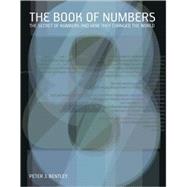
Note: Supplemental materials are not guaranteed with Rental or Used book purchases.
Purchase Benefits
What is included with this book?
Peter J. Bentley is a senior research fellow and professor at the Department of Computer Science, University College London, and is well known for his prolific research covering all aspects of evolutionary computation and digital biology. He is the author of the popular science book Digital Biology and a regular contributor to BBC Radio 4.
| Before the Beginning | |
| Much Ado About Nothing | |
| Writing Numbers | |
| Speaking Numbers | |
| The Invention of Nothing The Year Zero? | |
| Small is Beautiful | |
| Rational Numbers An Important Period Thinking Small | |
| All is One Natural Numbers | |
| Perfect Numbers | |
| Amicable Numbers | |
| Prime Numbers | |
| Secure Primes Fractionally One | |
| Murdering Irrationals | |
| Being Irrational | |
| Measuring the World | |
| Moving the World with Numbers | |
| When Is a Number not a Number | |
| An Equation Paints a Thousand Words | |
| Lost in the Margins | |
| Golden Phi Seriously, Rabbits? | |
| Out of this World Don't Be Absurd | |
| Good and Even There Are 10 Types of People in the World: Those Who Understand Binary and Those Who Don't Weaving Patterns of Numbers | |
| Thinking Logically Knocking Down the Foundations of Mathematics | |
| It Does Not Compute Designing Computer Architectures | |
| Creating the Information Revolution | |
| The Greatest Invention Calculating Without Calculators Natural Curves Pebbles and Fluxions | |
| The Eternal Triangle Placing Rubber Bands Crossing Bridges Wormholes of Paper Colorful Maps | |
| A Slice of Pi Making a Circle How to Make a Pi Measuring Angles Surfing Sine Waves Pendulums and Heresy | |
| Decimalization Weird Counting At the Third Stroke, the Time Will Be 86 Past 5 Precisely Sacred Tetractys and Triangles | |
| Triskaidekaphobia Be Careful What You Believe Mathematics of Luck Finding Meaning with Numbers | |
| As Fast As You Can Go Seeing c Seeing Is Not the Same as Hearing Special Relativity General Relativity | |
| The Neverending Story The Beginning of Forever Wheels Within Wheels Meeting the Infinite | |
| Unimaginable Complexity | |
| Using Your Imagination | |
| Drawing on Imagination | |
| Turning Dreams into Reality (or Reality into Dreams?) | |
| Complex Visions | |
| All is Numbers | |
| Bibliography | |
| Index | |
| Table of Contents provided by Publisher. All Rights Reserved. |
The New copy of this book will include any supplemental materials advertised. Please check the title of the book to determine if it should include any access cards, study guides, lab manuals, CDs, etc.
The Used, Rental and eBook copies of this book are not guaranteed to include any supplemental materials. Typically, only the book itself is included. This is true even if the title states it includes any access cards, study guides, lab manuals, CDs, etc.